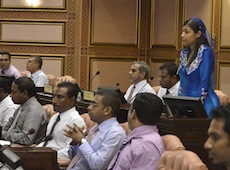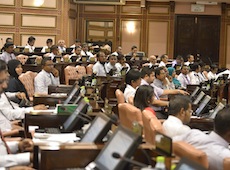Additional reporting by Zaheena Rasheed
Indian infrastructure giant GMR has won its arbitration case against the Government of Maldives (GoM) for the premature termination of its airport development agreement in 2012.
In a letter sent to the Bombay Stock Exchange, the company explained that the tribunal has said the 18 month tribunal found the agreement to have been “valid and binding”.
“GoM and MACL [Maldives Airports Company Ltd] are joint and severally liable in damages to GMIAL for loss caused by wrongful repudiation of the agreement as per the concession agreement,” read today’s letter.
“It has always been our firm belief that the cancellation of our concession agreement amounted to wrongful repudiation by the Government of Maldives and the Tribunal has upheld this standard,” wrote GMR Company Secretary C.P. Sounderarajan.
The determining of liability – the first of two phases of arbitration – will now be followed by the determining of compensation owed, with the Indian company seeking US$1.4billion – a figure which exceeds the Maldives annual budget.
Current Attorney General Mohamed Anil has recently expressed his belief that the government was liable only for GMR’s initial outlay of US$78million, plus any costs for construction work completed after the 2010 deal was agreed.
The President’s Office has said that the attorney general will provide a briefing on the case later today.
With the compensation fee yet to be decided, the impact of the tribunal’s decision is still unclear, although the World Bank has previously noted that it would place severe pressure on the country’s already “critically low” foreign reserves.
Hamid Abdul Ghafoor, spokesman for the opposition Maldivian Democratic Party – under whose tenure the deal was brokered has described the decision as a “major breakthrough”.
Void ab initio?
As well as ordering the Maldives to pay GMR’s Malé International Airport Limited (GMIAL), US$4 million within 42 days for cost of proceedings, GMR have revealed further details of the award.
According to GMR the private arbitration proceedings – disclosed in line with its regulatory requirements – deemed the deal “not void for any mistake of law or discharged by frustration”.
The decision to cancel the deal was made in November 2012 by the administration of President Dr Mohamed Waheed, with then Attorney General Azima Shukoor declaring the deal void ab initio – meaning that the contract was invalid from the outset.
Shukoor further cited English contract law of ‘frustration’, which acts as a device to set aside contracts where an unforeseen event either renders contractual obligations impossible, or radically changes the party’s principal purpose for entering into the contract.
GMR have today revealed the tribunal’s finding that the collection of Airport Development Charge and Insurance Surcharge – contentious points preceding the contracts termination – to have been lawful under Maldivian law.
The US$511 million agreement to develop Ibrahim Nasir International Airport (INIA) – signed during the tenure of former President Mohamed Nasheed – represented the largest foreign direct investment in the Maldives history.
Legal and political wrangling regarding the deal began before GMR had even assumed management of the airport, however, with the then opposition attacking the deal as part of an increasingly fervent anti-government movement which would eventually lead to the controversial resignation of Nasheed in February 2012.
Concession and compensation
The previous December a case filed in the Civil Court by opposition parties ruled that the Airport Development Charge – key to the agreement’s financial viability – was deemed illegal.
Following the ruling, the Nasheed government reached an agreement with GMR to deduct the lost revenue – anticipated to have been US$25 million per year – from concession payments owed to the government.
This decision resulted in further tensions after the fall of the Nasheed government, with GMR contract’s detractors – now in office –receiving a series of bills as the lost ADC revenue eclipsed any concession payments owed.
The ADC matter was subsequently referred to the Singapore arbitration court – as agreed in the initial concession agreement – while senior figures in the government pleaded with Indian PM Manmohan Singh to cancel the agreement, citing growing anti-Indian sentiment in the country.
In today’s letter, GMR revealed that the tribunal had ruled both the charge, and the subsequent adjustment was also “lawful and binding on MACL and GoM”.
The termination of the contract was accompanied by a cooling of relations with neighbour India as well as questions regarding foreign investor confidence in the Maldives – both issues that incumbent President Abdulla Yameen has sought to address since his election in November.
Future investment
Yameen – whose Progressive Party of Maldives has distanced itself from termination of the GMR deal, despite being the largest party in the coalition government at the time – has pledged to create an environment conducive to further foreign investment.
As well as introducing plans for special economic zones within the country, Yameen’s government has embarked on a drive for foreign investors – suggesting that even GMR would be welcomed back to work on new projects.
“We are going to open up the Maldives in a huge way to foreign investors. Our thirst cannot be quenched. The opportunity to foreign investors is going to be enormous,” said the president in April.
Projects outlined at a landmark Singapore Investment Forum included the further development of Malé International Airport, though Yameen has said that overall management would remain in Maldivian hands due to its national commercial and security importance.
New plans for redevelopment of the airport will include foreign investors – an issue that continues to cause controversy – under the management of the state-owned MACL.
MDP Spokesman Hamid today suggested that the tribunal’s decision would deter further investment and foreign financing in the Maldives and – depending on the compensation amount – could result in the state’s bankruptcy.
Hamid reiterated his party’s recent calls for GMR’s reinstatement, stating the the MDP would be considering further legal action following the tribunal’s decision.
 (1)Dislikes
(1)Dislikes (0)
(0)
